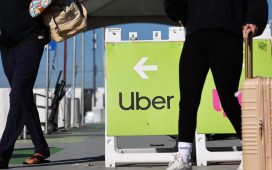OpenAI’s board of directors said Friday that Sam Altman will step down as CEO and will be replaced by technology chief Mira Murati.
The company said it conducted “a deliberative review process” and “concluded that he was not consistently candid in his communications with the board, hindering its ability to exercise its responsibilities.”
“The board no longer has confidence in his ability to continue leading OpenAI,” the statement said.
OpenAI’s board includes chief scientist Ilya Sutskever and independent directors like Quora CEO Adam D’Angelo, technology entrepreneur Tasha McCauley, and Helen Toner of the Georgetown Center for Security and Emerging Technology. OpenAI says the board of its 501(c)(3) is the “overall governing body for all OpenAI activities.”
The board also said that Greg Brockman, OpenAI’s president, “will be stepping down as chairman of the board and will remain in his role at the company, reporting to the CEO.”
Sam Altman acknowledged that he was leaving OpenAI in a post on X on Friday, but did not mention any accusations by the firm’s board that he failed to be candid during unspecified reviews.
“i loved my time at openai,” Altman said in the X post. “it was transformative for me personally, and hopefully the world a little bit. most of all i loved working with such talented people.”
“will have more to say about what’s next later,” Altman added.
OpenAI, which has raised billions of dollars from Microsoft and ranked first on CNBC’s Disruptor 50 list this year, jumped into the mainstream late last year after releasing its AI chatbot ChatGPT to the public. The service went viral by allowing users to convert simple text into creative conversation and has pushed big tech companies like Alphabet and Meta to step up their investments in generative AI.
Microsoft shares slipped after the announcement, closing the day down 1.7% at $369.84.
A Microsoft spokesperson said in a statement that the company has “a long-term partnership with OpenAI and Microsoft remains committed to Mira and their team as we bring this next era of AI to our customers.”
OpenAI launched as a non-profit model in 2015 with backing from Tesla CEO Elon Musk, who reportedly committed $1 billion to the project. Before taking over as CEO, Altman was president of startup accelerator Y Combinator and gained prominence in Silicon Valley as an early-stage investor. Earlier in his career, he started social networking company Loopt.
As OpenAI’s popularity grew this year alongside ChatGPT, so too did Altman’s profile. He became an ambassador of sorts, representing the ballooning AI industry across the globe.
In September, Altman, 38, was awarded by Indonesia the so-called “Golden Visa,” providing him with 10 years worth of various travel accommodations and perks intended to help the country gain more foreign investors.
Altman visited various Asia-Pacific countries over the summer including Singapore, India, China, South Korea and Japan, meeting with government leaders and officials and giving public speeches on the rise of AI and the need for regulations.
The technologist testified in front of the U.S. Senate in May, calling on lawmakers to regulate AI, citing the technology potential to have a negative impact on the job market, the information ecosystem, and other societal and economic concerns.
“I think if this technology goes wrong, it can go quite wrong,” Altman said at the time. “And we want to be vocal about that. We want to work with the government to prevent that from happening.”
In prelude to his Senate testimony, Altman also spoke at a dinner with roughly 60 lawmakers, who were reportedly wowed by his speech and demonstrations.
“It’s not easy to keep members of Congress rapt for close to two hours,” said Rep. Ted Lieu, D-Calif., vice chair of the House Democratic Caucus who co-hosted the dinner with GOP Conference Vice Chair Mike Johnson, R-La. “So Sam Altman was very informative and provided a lot of information.”
More recently, Altman spoke this week at the Asia-Pacific Economic Cooperation conference in San Francisco, along with various technology executives and world leaders including U.S. President Joe Biden and Chinese President Xi Jinping.
Altman didn’t immediately respond to a request for more information.
— CNBC’s Lora Kolodny contributed to this report











